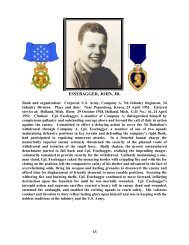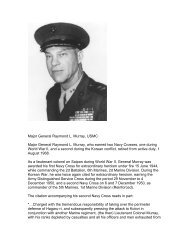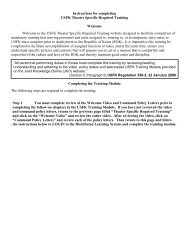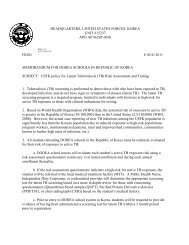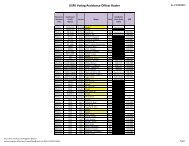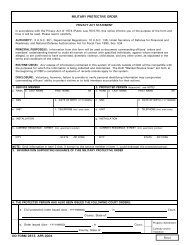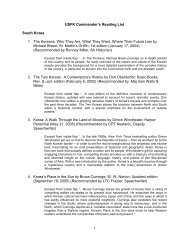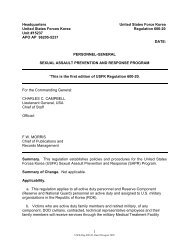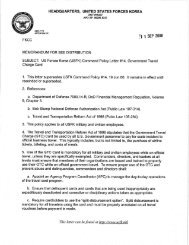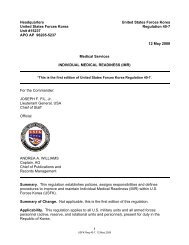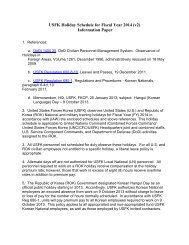Curtis Utz, Assault from the Sea, The Amphibious Landing, Naval ...
Curtis Utz, Assault from the Sea, The Amphibious Landing, Naval ...
Curtis Utz, Assault from the Sea, The Amphibious Landing, Naval ...
You also want an ePaper? Increase the reach of your titles
YUMPU automatically turns print PDFs into web optimized ePapers that Google loves.
Korea: <strong>The</strong> “Cockpit of Asia”<br />
Korea has long been an<br />
Asian battleground.<br />
<strong>The</strong> mighty Genghis<br />
Khan and his Mongol horde<br />
swept into Korea in <strong>the</strong> 13th<br />
century. For <strong>the</strong> next 600<br />
years, <strong>the</strong> Mongols and <strong>the</strong>ir<br />
successors to <strong>the</strong> throne of<br />
China dominated <strong>the</strong> diminutive<br />
Kingdom of Korea. Every<br />
year, <strong>the</strong> Korean king pledged<br />
his fealty to <strong>the</strong> emperor in<br />
Beijing, but aside <strong>from</strong> this<br />
connection with <strong>the</strong> outside<br />
world, <strong>the</strong> Koreans jealously<br />
guarded <strong>the</strong>ir isolation. In<br />
fact, <strong>the</strong> Korean monarchs<br />
banned overseas trade and<br />
discouraged contact between<br />
<strong>the</strong>ir subjects and foreigners.<br />
<strong>The</strong> ruggedness of <strong>the</strong> coastline<br />
and <strong>the</strong> perilous seas<br />
around <strong>the</strong> Korean peninsula<br />
helped enforce <strong>the</strong>ir royal<br />
edicts. Outsiders appropriately<br />
referred to Korea as <strong>the</strong><br />
“Hermit Kingdom.”<br />
In <strong>the</strong> latter half of <strong>the</strong><br />
19th century, Americans<br />
learned just how serious <strong>the</strong><br />
Koreans were about <strong>the</strong>ir<br />
desire to be left alone. In<br />
1866, <strong>the</strong> Koreans massacred<br />
<strong>the</strong> crew of American merchant<br />
schooner General<br />
Sherman, which had run<br />
aground in <strong>the</strong> Taedong<br />
River near Pyongyang. <strong>The</strong><br />
Navy dispatched Commander<br />
Robert W. Shufeldt, commanding<br />
officer of <strong>the</strong> screw<br />
sloop of war Wachusett, to<br />
discuss <strong>the</strong> incident with <strong>the</strong><br />
King of Korea. <strong>The</strong> monarch<br />
refused to deal with him.<br />
Despite this rebuff, U.S.<br />
naval leaders in <strong>the</strong> Far East<br />
convinced Washington that<br />
NHC NH 79263<br />
Commodore Robert Shufeldt circa 1880.<br />
As a commander, Shufeldt investigated<br />
<strong>the</strong> 1866 massacre of <strong>the</strong> crew of <strong>the</strong><br />
American schooner General Sherman<br />
in Korea’s Taedong River. In 1882, as<br />
a diplomatic representative of <strong>the</strong><br />
United States, he negotiated a treaty<br />
of friendship with <strong>the</strong> King of Korea.<br />
Korea could be “opened” for<br />
trade and diplomatic relations.<br />
<strong>The</strong> visits of Commodore<br />
Mat<strong>the</strong>w C. Perry and his<br />
“black ships” to Japan in<br />
<strong>the</strong> 1850s, which stimulated<br />
<strong>the</strong> Japanese to cultivate contacts<br />
with <strong>the</strong> Western world,<br />
clearly influenced <strong>the</strong>se officers.<br />
In 1871, Rear Admiral<br />
John Rodgers led five U.S.<br />
Navy warships up <strong>the</strong> Salee<br />
River until <strong>the</strong>y were under<br />
<strong>the</strong> guns of <strong>the</strong> Korean forts<br />
above Inchon. <strong>The</strong> Koreans,<br />
as <strong>the</strong>y had done in <strong>the</strong> past,<br />
greeted <strong>the</strong> foreigners with<br />
gunfire. Rodgers’s ships returned<br />
fire and put ashore a<br />
landing party of sailors and<br />
Marines, who seized <strong>the</strong> forts.<br />
NHC NH 79942<br />
U.S. sailors battle Korean troops during Commodore John Rodgers attack on<br />
<strong>the</strong> forts near lnchon in 1871. Artist unknown.<br />
3



